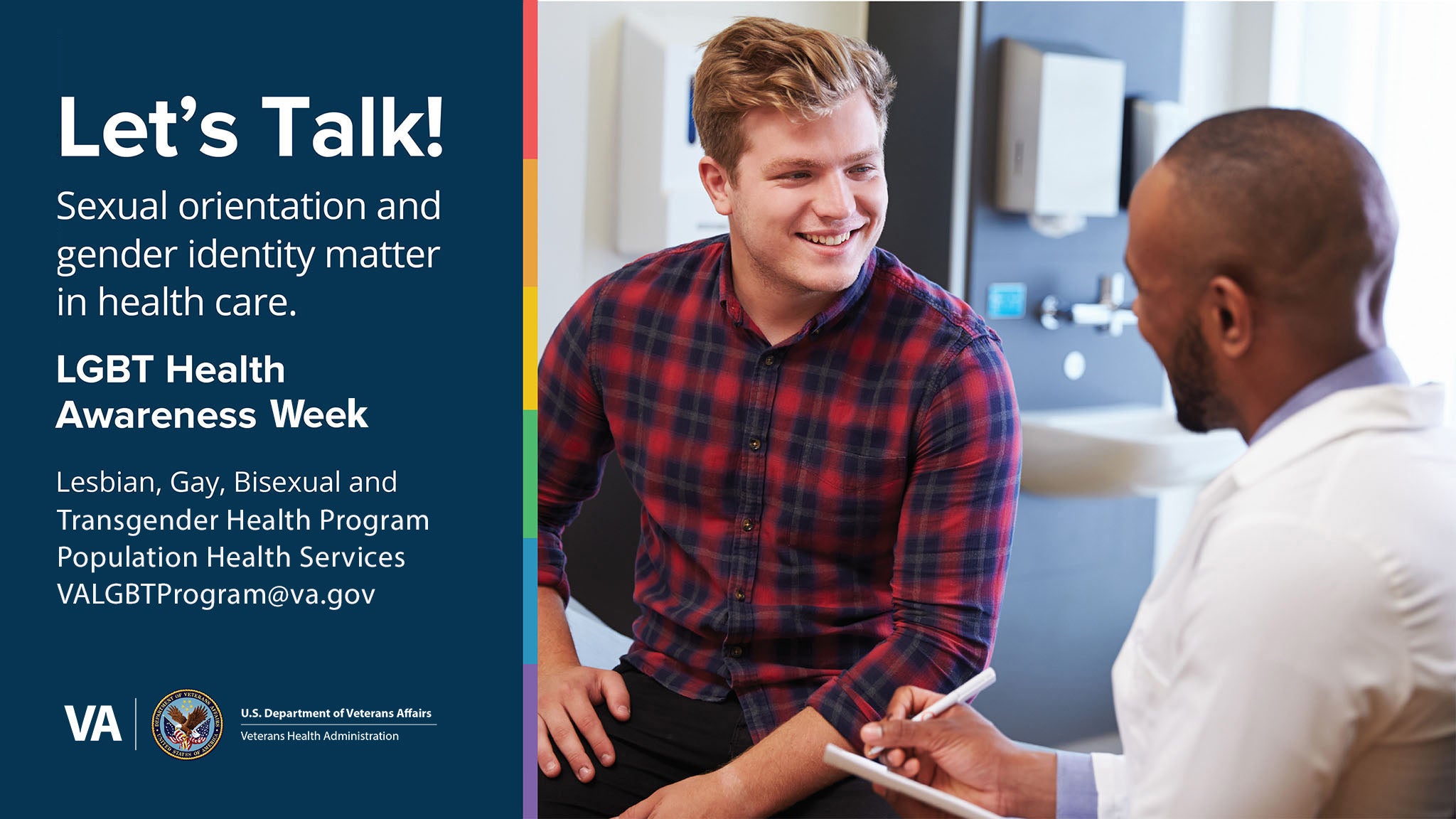Gay and bisexual Veterans face increased health risks and unique challenges in accessing quality health care. There are an estimated 1 million lesbian, gay, and bisexual Veterans in the United States. Many of these Veterans may receive care at the VHA. We are working to be a national leader in health care for LGBT Veterans and assure that high-quality care is provided in a sensitive, respectful environment at VHAs nationwide. The following is a list of the top things gay and bisexual male Veterans should discuss at their VHA visits.
SEXUALLY TRANSMITTED INFECTIONS (STIS) STIs occur in sexually active gay and bisexual men at a high rate. Some STIs can be cured (syphilis, gonorrhea, chlamydia, pubic lice), and some can be effectively treated but not cured (HIV, hepatitis, human papilloma virus, herpes). Condom use reduces the risk of STIs. Risk of exposure increases with the number of sexual partners. Because you can have an STI without symptoms, and transmit it to others, screening is important. » HIV/AIDS Men who have sex with men are at an increased risk of HIV infection. Condom use can reduce the risk of receiving or transmitting HIV. Pre-Exposure Prophylaxis (PrEP) is one strategy for reducing the risk of getting infected with HIV. If you are not HIV positive, discuss with your VHA provider whether PrEP is best. If you are HIV positive, you need to be in care with an HIV provider. » HEPATITIS IMMUNIZATION AND SCREENING Men who have sex with men are at an increased risk of exposure to the viruses that cause serious liver conditions known as hepatitis. These infections can lead to very serious long-term issues such as liver failure and liver cancer. Immunizations are available to prevent two of the three viruses. Immunization for hepatitis A virus and hepatitis B virus is recommended for all men who have sex with men. Condom use and not sharing needles are effective at reducing exposure to viral hepatitis and are currently the only means of prevention for the hepatitis C Virus. If you have hepatitis C, talk to your provider about the new treatments that can cure this infection. » HUMAN PAPILLOMA VIRUS (HPV) Of all the sexually transmitted infections gay and bisexual men are at risk for, HPV—which causes anal and genital warts—is often thought to be little more than an unsightly inconvenience. However, these infections may play a role in the increased rates of anal cancers in gay men. Some health professionals now recommend routine screening with anal Pap Smears, similar to the test done for women to detect early cancers. Talk to your provider about whether an anal Pap Smear is recommended.
1. COME OUT TO YOUR HEALTH CARE PROVIDER In order to provide you with the best care possible, your VHA doctor should know you are gay or bisexual. It should prompt him/her to ask specific questions about you and offer appropriate health screens. If your provider does not seem comfortable with you as a gay or bisexual man, ask for another VHA provider. Coming out to your providers is an important step to being healthy. For frequently asked questions about privacy, see Your Privacy Matters on page 3.
2. MENTAL HEALTH Depression and anxiety affect gay and bisexual men at a higher rate than heterosexual men. Veterans are also at higher risk of some mental health problems than nonVeterans. Gay and bisexual men may be more at risk for PTSD and chronic stress from discrimination. Living with this stress can worsen depression and anxiety and may also contribute to thoughts of suicide. These problems may be more severe for men who remain “in the closet” or who do not have adequate social supports. Culturally-appropriate mental health services for gay and bisexual men for the prevention, early detection, and treatment of these conditions should be available at your VHA. If you are in crisis, please call 911, go to your nearest Emergency Room, or call the Veterans Crisis Line at 1-800-273-8255 (press “1” after you call).
3. SUBSTANCE USE/ALCOHOL Heavy drinking and substance use are common among gay and bisexual men. Alcohol and drug misuse can lead to serious health, relationship, employment, and legal problems. Problems with drinking or drug use may occur in response to stress, and/or in combination with PTSD, depression, or other medical conditions. Fortunately, there are proven methods to help Veterans recover from alcohol or drug misuse, including mutual help groups and more intensive treatments. VHA has many resources to help Veterans (including gay and bisexual Veterans) and their loved ones answer questions, find support, get treatment, and recover.
4. TOBACCO USE Gay and bisexual men use tobacco at higher rates than heterosexual men. Tobacco-related health problems include lung disease and cancer, heart disease, high blood pressure, and many other serious problems. All gay and bisexual men should be screened for and offered culturally-appropriate prevention and cessation programs for tobacco use. VHA has programs to help you quit smoking. Talk to your provider about how VHA can help or call 1-855-QUIT-VET to get started. Get text messages to help you quit smoking from SmokefreeVET—text the word VET to 47848 or visit http:// smokefree.gov/VET to sign up.
GAY AND BISEXUAL HEALTH CARE
5. SEXUALLY TRANSMITTED INFECTIONS (STIS) STIs occur in sexually active gay and bisexual men at a high rate. Some STIs can be cured (syphilis, gonorrhea, chlamydia, pubic lice), and some can be effectively treated but not cured (HIV, hepatitis, human papilloma virus, herpes). Condom use reduces the risk of STIs. Risk of exposure increases with the number of sexual partners. Because you can have an STI without symptoms, and transmit it to others, screening is important. » HIV/AIDS Men who have sex with men are at an increased risk of HIV infection. Condom use can reduce the risk of receiving or transmitting HIV. Pre-Exposure Prophylaxis (PrEP) is one strategy for reducing the risk of getting infected with HIV. If you are not HIV positive, discuss with your VHA provider whether PrEP is best. If you are HIV positive, you need to be in care with an HIV provider. » HEPATITIS IMMUNIZATION AND SCREENING Men who have sex with men are at an increased risk of exposure to the viruses that cause serious liver conditions known as hepatitis. These infections can lead to very serious long-term issues such as liver failure and liver cancer. Immunizations are available to prevent two of the three viruses. Immunization for hepatitis A virus and hepatitis B virus is recommended for all men who have sex with men. Condom use and not sharing needles are effective at reducing exposure to viral hepatitis and are currently the only means of prevention for the hepatitis C Virus. If you have hepatitis C, talk to your provider about the new treatments that can cure this infection. » HUMAN PAPILLOMA VIRUS (HPV) Of all the sexually transmitted infections gay and bisexual men are at risk for, HPV—which causes anal and genital warts—is often thought to be little more than an unsightly inconvenience. However, these infections may play a role in the increased rates of anal cancers in gay men. Some health professionals now recommend routine screening with anal Pap Smears, similar to the test done for women to detect early cancers. Talk to your provider about whether an anal Pap Smear is recommended.
6. PROSTATE, TESTICULAR, COLON, AND ANAL CANCER Gay and bisexual men may be at risk of prostate, testicular, or colon cancer. Some research has found gay men at higher risk for anal cancer than heterosexual men. Screening for these cancers occurs across the life cycle and screening may occur less often if you are not “out” with your provider.
7. FITNESS (DIET AND EXERCISE) Problems with body image are more common among gay and bisexual men than heterosexual men, including eating disorders such as bulimia or anorexia. While regular exercise is healthy, the use of substances such as anabolic steroids and certain supplements can be dangerous. If you are overweight, you are at risk of diabetes, high blood pressure, joint problems, and heart disease. Talk to your VHA provider about the MOVE! Weight Management Program.
8. HEART HEALTH Gay and bisexual men are more likely than heterosexual men to have high blood pressure and an increased risk of heart disease. High blood pressure is a major risk factor for cardiovascular disease and can be affected by stress, including stress from discrimination. High blood pressure can be managed with healthy lifestyle changes and medications. Getting your blood pressure checked regularly is important because high blood pressure often has no symptoms. LGBT VETERAN HEALTH CARE 3 GAY AND BISEXUAL HEALTH CARE
9. ERECTILE DYSFUNCTION Gay and bisexual men report erectile dysfunction more often than heterosexual men. Erectile dysfunction is the inability to get and keep an erection firm enough for sex. Having erection trouble from time to time isn’t necessarily a cause for concern. But if erectile dysfunction is an ongoing problem, it may lead to distress or relationship problems. Talk to your doctor if you are having erectile problems on a regular basis. Persistent problems getting or keeping an erection can be a sign of a health condition that needs treatment, such as heart disease or poorly controlled diabetes. VHA offers effective treatments for erectile dysfunction.
Source:https://www.patientcare.va.gov/LGBT/docs/va-pcs-lgbt-factsheet-gay-bisexual.pdf
10. OLDER GAY AND BISEXUAL MEN Older gay and bisexual men are likely to have experienced stigma, discrimination and violence related to sexuality. Older gay and bisexual men who need assistance are less likely to receive care from adult children and may experience discrimination in nursing homes or community living centers or live in fear of discrimination. VHA has non-discrimination policies in place to protect older gay and bisexual men and their partners in VA facilities.
11. INTIMATE PARTNER VIOLENCE (IPV) IPV refers to violence and aggression between intimate partners which can include physical, sexual or psychological abuse or stalking. IPV can be a single event or last for many years. The impact of IPV can reach far beyond the actual or threatened violence or aggression. Military sexual trauma (MST) is the term used by VHA to refer to experiences of sexual assault or repeated, threatening sexual harassment that a Veteran experienced during his miltary service. VHA has a number of resources available for men who have experienced IPV, including violence from same-sex partners. VHA offers effective therapies for mental health problems that commonly occur with IPV, such as PTSD, depression, anxiety and alcohol or drug use problems. Every VHA facility has providers knowledgeable about treatment for the after effects of MST.






